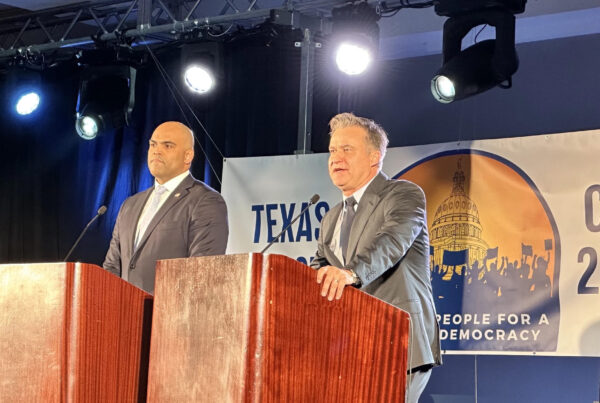From KERA News:
A question about Texas seceding from the U.S. won’t be on the GOP primary ballot this year.
The state Republican party rejected the measure even after the Texas Nationalist Movement turned in what it says were 140,000 voter signatures.
Although the effort failed, it was the closest the Texas Nationalist Movement has come to putting “Texit” up for a vote in the group’s nearly two decades of trying – and supporters say it could signal a shift in state politics.
“The Texas nationalist movement is able to strike a chord with Republican primary voters with the idea of Texas being a unique state,” said Rice University political science professor Mark Jones. “So while support among Texas Republicans for secession is very low, there is support for the idea of Texas having more autonomy.”
A history of secession
The idea of secession isn’t new in Texas politics – the state was briefly a sovereign country after it declared independence from Mexico in 1836. And years after it was annexed into the U.S., Texas left the Union to join the Confederacy in 1861.
Jones said an “increasing lack of trust and confidence” in the federal government — among Republicans and Democrats — is giving the current movement a boost.
“They’ve been able to get above the radar more in the past year or two than in prior eras, where there wasn’t as much support,” Jones said. “In part because there wasn’t as much frustration with the federal government in general.”
According to the Pew Research Center, 58% of Americans see the country declining in the next 25 years; they expect the U.S. to be economically weaker, the political divide to grow, and a larger gap between the wealthy and the working class.
Jones said when people feel like the government isn’t working for them, they tend to do one of three things.
They might disengage from politics entirely – not participating in local or national elections.
They might join a movement to make changes within the system – for example, the Tea Party of the 2010s.
The third option, which Jones said is the most extreme, is to attempt to secede from the U.S.
“They see a country that they no longer identify with as much as they might have in the past,” he said. “And instead of trying to change it or accepting the change, they want to leave it.”
Joe Glass, a resident of Fort Worth, was one of roughly 140,000 voters who signed the petition to get the Texit question on this year’s Republican primary ballot.
“I’ve never been a big American guy,” he said. “I’ve been more of a Texan guy.”
Glass doesn’t consider himself a Republican, and he doesn’t support the Texas Nationalist Movement. But he does believe Texas should leave the union.
“I feel like everybody would agree that this federal government has not, that they have not represented us for a long time,” he said.
Texas Nationalist Movement president Daniel Miller said the petition last fall wasn’t a sudden spike in support – “just a continuation of where we have been going” since he started the organization 18 years ago.
“We’ve tapped into an underlying sentiment related to the independence issue that has gone largely ignored by the mainstream media,” he said, “but more importantly, has been completely ignored by the political establishment, at least publicly.”
Republicans and Texit
The “mainstream” Texas Republican desire for more state autonomy and TMN’s desire to leave the U.S. often overlap, Jones said.
This can be seen in the recent tensions between Gov. Greg Abbott and the Biden administration over immigration at the southern border. The secessionist movement is a way to vocalize the growing frustration that Texas conservatives have with the federal government, said Matthew Wilson, a political science professor at Southern Methodist University.
“It’s still not a movement that’s likely to go anywhere,” Wilson said. “But it’s a way that people can blow off steam, can signal their dissatisfaction with the national government.”
Wilson said since the proposed ballot referendum is non-binding, Texas lawmakers aren’t required to do anything by law. Still, its passing would show how dissatisfied the Texas GOP base is with the direction the country is heading.
“It would serve as an inspiration to people in other states who are interested in breakaway movements,” Wilson said.
Wilson said politically, a successful non-binding secession vote could be used as a talking point by local and national Democrats as an example of extremism within the state GOP.
Miller disagrees with the perception of Texit as a “knee jerk reaction” to the border crisis. He said it could start a serious conversation about leaving the country.
But even if the idea of Texit — or any other secessionist effort — does gain traction and gets a vote, it would still face major hurdles: The U.S. Supreme Court ruled in 1869 that states can’t unilaterally secede from the Union. That ruling, Texas v. White, was spurred after the last time the state seceded.
The Texas First pledge
Texit hasn’t only gained support from some conservative voters — more than 60 Republican candidates and two dozen officeholders, from city council members to state representatives, have signed the Take Texas Back pledge, showing their “commitment to a contract with Texans, promising to vote and act solely in the best interests of Texans.”
“It seems to me our voters have been absolutely clear on this issue. They want a vote,” said Jack Reynolds, candidate for Texas House District 99, who signed the pledge.
Reynolds, who is endorsed by Attorney General Ken Paxton, said the state GOP is scared to put the secession referendum on a ballot because it would pass.
State GOP Chairman Rinaldi — whose opponent, Dana Myers, signed the pledge — said he doesn’t blame people for supporting Texit. But he said Republicans haven’t taken the “baby steps” of taking back state autonomy from the federal government.
“We haven’t even tried challenging a federal court order,” Rinaldi said. “How can you talk about, how could you talk about seceding from the Union?”
Rinaldi thinks Miller is doing his movement a disservice with the legal tactics he used to try to get the Texit question on the ballot, but said the movement still has a place in the party.
“There are some of our most dedicated supporters and hard workers and good friends,” Rinaldi added.
Although ballots went out without the Texit question this year, Miller said the group plans to get the Texas Independence Referendum Act filed for the next legislative session in 2025. A similar bill failed to make it out of committee in the last session.
Miller said he is confident that Texans will vote on Texit in the coming year.
“Everybody’s coming to a realization of something that we’re headed straight into Texas potentially becoming a self-governing, independent nation,” he said.














